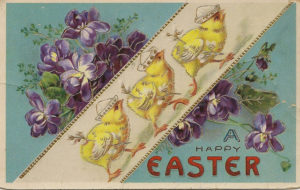Robert Earl Britton’s long letter to the editor of the Kinsley Graphic continues below. One hundred years ago, Easter Sunday fell on March 31, one day earlier than it does this year.
“Now folks, you have noticed the fact that boys that have gone into the various training camps, have with very few exceptions gained in weight or in case of overweight, reduced to the normal. Well I noticed it and didn’t understand why it was, but the reason is very plain now as we have witnessed the change in ourselves. Bitner and Julian have gained twelve pounds each. Lovett eight and myself fourteen, this change took place in thirty days.
The fact that the laws governing health are rigidly enforced and strict attention is given to sanitation are the cause of this notable change.
Our ‘chow’ comes at regular hours with a well-balanced menu. Today it is above the average, due to the Easter celebration. It was this: Vegetable soup, celery, head lettuce with salad dressing. Baked chicken with dressing, roast pork pan gravy. Mashed potatoes, asparagus tips with drawn butter. Hot mince pie, coffee and all the bread and butter we wanted to fill in.
The hours for sleep are regular, taps at 9:05 o’clock and reveille at 5:15.
The time is well occupied from reveille to taps, it being arranged so there is something to do every minute. We have plenty of exercise in the form of company drill, physical drills with arms and various forms of athletics. Also we are allowed a certain time to do our washing, each man being compelled to scrub his own clothes.
In regard to the sanitary condition of the camp, I will say nothing except that it is as near perfect as could possibly be.
I think the naval authorities must have heeded the old saying when they made the rules and regulations governing this part of it i.e. ‘cleanliness is next to Godliness.’
The moral standard maintained here is well up with that of any other one of the various camps, that is, judging from what I have read of other places and what I have seen here.
I want to say a word here in praise of the army and navy YM.C.A. and the service which it renders. Its value cannot be appreciated to its fullest extent by anyone other than those placed in the environment of camp life. It is the cause of a higher moral standard being maintained and I can well imagine that to the boys over there in the trenches it is worth many times more than to us here, so keep the good work going.
With best wishes to all friends and acquaintances, I bid you a kind good-bye. Robert Earl Britton

